City of Split and HNS Meet: Details Revealed
September 19, 2019 - Croatia and Hungary will meet at Poljud Stadium next month for a crucial Euro 2020 qualifier. The City of Split and HNS sat down at Poljud on Wednesday to discuss the details.
Slobodna Dalmacija and Gol.hr report that a five-hour marathon meeting was held on Wednesday at Poljud on the topic of the upcoming Croatia-Hungary match, which will be played on Thursday 10 October. The media learned at 3 pm on Wednesday that everything is going according to plan, and that they are moving to the City Administration where they will finalize the contract they had not yet signed.
Just after 10 am, executive chairman Marijan Kustic arrived at the head of a large HNS delegation, including Vlado Iveta, Niksa Martinac, Zoran Cvrk, and female representatives and match managers Helena Pushkar and Antonia Burazer, who runs the VIP.
“What are the points in the contract? The organization of the match, the items that HNS is taking over, that is what we spoke about. There is no controversy, but there are a lot of details, a lot of points, so everything took five hours,” Kustic said pleased after the meeting.
Is Hajduk still not participating in the organization of the match?
“I’d be the happiest if they chose to participate. But, we are negotiating with the City and signing a contract with them,” Kustic added.
Split Mayor of Andro Krustolovic Opara was only at the beginning of the meeting to welcome the HNS delegation to Poljud, before hurrying back to the City Administration. Thus, the details were agreed by Mate Omazic and Domagoj Maroevic, and Kustic was to join Opara at the City Administration later.
"It is important that the people and services work and cooperate and look for the best model for this to be a win-win situation," said Split Mayor Andro Krstulovic Opara. Recall, Dalmatinski Portal reported that the message ‘Opara liar - choose a side' welcomed the Split Mayor in front of Poljud Stadium on Wednesday.
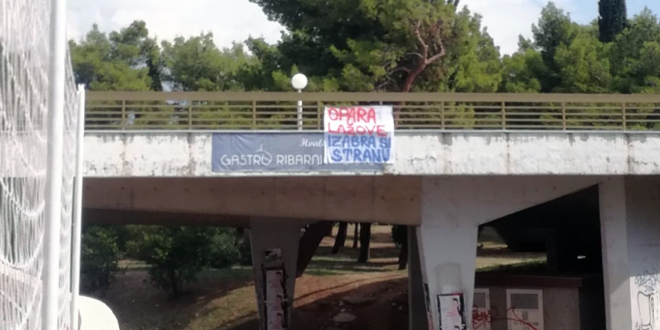
While some might think the most important win would entail qualifying points, the victories the mayor speaks of is normalizing relationships in Croatian football - and with Hajduk specifically.
"I want both Hajduk and HNS to come to the situation they announced two months ago, and I believe we are on the right track," Opara added.
"The items that HNS itself is taking over are in regards to the organization, and they are taking over some of the things that we have discussed. But in the end, we agreed on everything," he said.
Thus, the return of the Croatia national team and 2018 World Cup finalists to Poljud in Split goes its course. Tickets will be on sale from Monday and run between 100 to 250 kuna. In responding to media reports, Kustic does not believe that ticket prices are unusually high (up to 250 kuna on the day of the match).
Recall, the match at Poljud on October 10 is the return of the national team to Split for the first time since 2015. The World Cup finalists last played at Poljud in 2015 against Italy behind closed doors. Before that, they met Georgia in 2011. Both matches were played as qualifiers for the European Championships, in 2012 and 2016 respectively.
Croatia is on the verge of qualifying for the Euro once again, and every four years the national team seems to arrive back in Split.
This will be the 13th ever match played in Split, at Poljud Stadium, since Croatia gained independence.
The meeting on Wednesday was the second of such a gathering at Poljud.
To read more about sport in Croatia, follow TCN’s dedicated page.
City of Split and HNS Meet at Poljud to Discuss Upcoming Euro 2020 Qualifier
September 18, 2019 - The City of Split and the Croatian Football Federation met at Poljud Stadium on Wednesday to discuss the technical details of organizing the upcoming Euro 2020 qualifier between Croatia and Hungary.
Slobodna Dalmacija writes that the Croatian Football Federation and the City of Split should take a new step towards hosting the upcoming Euro 2020 qualifier between the national teams of Croatia and Hungary, which will be played on October 10 at Poljud. The meeting likely focused on the organization of the match.
It is necessary to emphasize that Hajduk is not involved in the organization of this match, that is, until HNS has shown serious signs towards normalizing their relationship. Recall, Hajduk previously presented their seven requirements to the umbrella football organization, which they expected to be fulfilled as a prerequisite for eventually becoming involved in the organization of this European qualifier.
Certain processes have been initiated, like the meeting in Dugopolje recently been held with HNS and the County Federation, but the results are nowhere near tangible. Thus, Hajduk will continue to hold off from jumping in on the organization of the national team match, which is here in just three weeks.
At 10:15 am Wednesday morning, an HNS delegation led by executive president Marijan Kustic and Zoran Cvrk arrived at Poljud. The representatives of the City of Split, led by Mayor Andro Krstulovic Opara, followed.
What we know thus far is that the main topic of the meeting would be to harmonize the technical details. However, some Croatian media unofficially reported that no contract had yet been signed to play the match between Croatia and Hungary at Poljud. This formality was expected on Wednesday or in the coming days.
While we await the details from the meeting, Dalmatinski Portal reported that the message ‘Opara liar - choose a side' welcomed the Split Mayor in front of Poljud Stadium on Wednesday.

Dalmatinski Portal / N.M.
Recall that Croatia and Hungary will plat at Poljud on October 10, which is the return of the national team to Split for the first time since 2015. The World Cup finalists last played at Poljud in 2015 against Italy behind closed doors. Before that, they met Georgia in 2011. Both matches were played as qualifiers for the European Championships, in 2012 and 2016 respectively.
Croatia is on the verge of qualifying for the Euro once again, and every four years the national team seems to arrive back in Split.
This will be the 13th ever match played in Split, at Poljud Stadium, since Croatia gained independence.
The meeting on Wednesday is the second of such a gathering at Poljud.
More details soon.
To read more about sport in Croatia, follow TCN’s dedicated page.
On this Day in 1979, VIII Mediterranean Games Begin in Split
September 15, 2019 - The VIII Mediterranean Games was held in Split from September 15-29, 1979. Today, we mark the 40th anniversary.
From the opening ceremony, which was held on September 15, 1979, to the closing ceremony, which was held on September 29, 1979, fourteen nations competed in 192 events across 26 different sports.
The Mediterranean Games hosted athletes who competed in 25 sports and 186 disciplines and forced Dalmatia to build capital facilities that at the time did not exist. While eight other cities in Dalmatia were involved, including Trogir, Makarska, Sinj, Hvar, Šibenik, Zadar, Omiš and Supetar, Split was the center of the event.
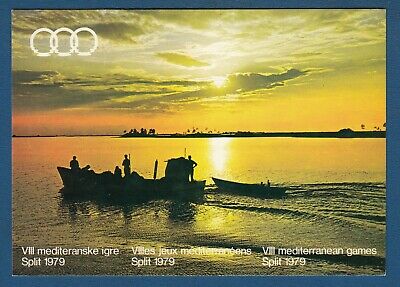
Postcard from the event
Recall, Split received a beautiful new stadium, Poljud, which at that time was one of the largest in Europe. A complex of pools was also built at Poljud, as well as a large and small hall at Gripe. A shooting range was constructed in Stobreč, and a complex of tennis courts and one for martial arts in Gripe. In addition to the HNK Split stadium, the Gripe basketball hall and court in Kaštel Gomilica were renovated.
Thanks to the Mediterranean Games, Split and many other cities in Dalmatia received a variety of new sports facilities. Trogir received a new sports hall, while Omiš renovated their football field. The Hippodrome in Sinj was updated, a field for archery in Supetar on Brač was built, a rowing track in Zaton was made, Zadar and Makarska received a new football field, and Hvar even received a new sports hall.
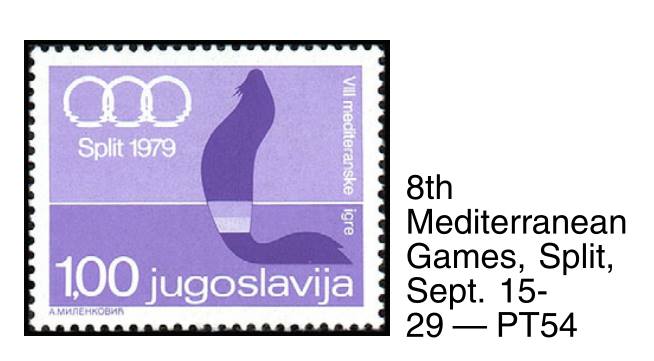
Postage stamps from the event
The entire visual concept of the Mediterranean Games in Split is credited to the well-known and multi-award-winning Croatian designer Boris Ljubičić - a man with origins in Sinj but an address in Zagreb. The simple three white circles are still revered in the graphic design world today.
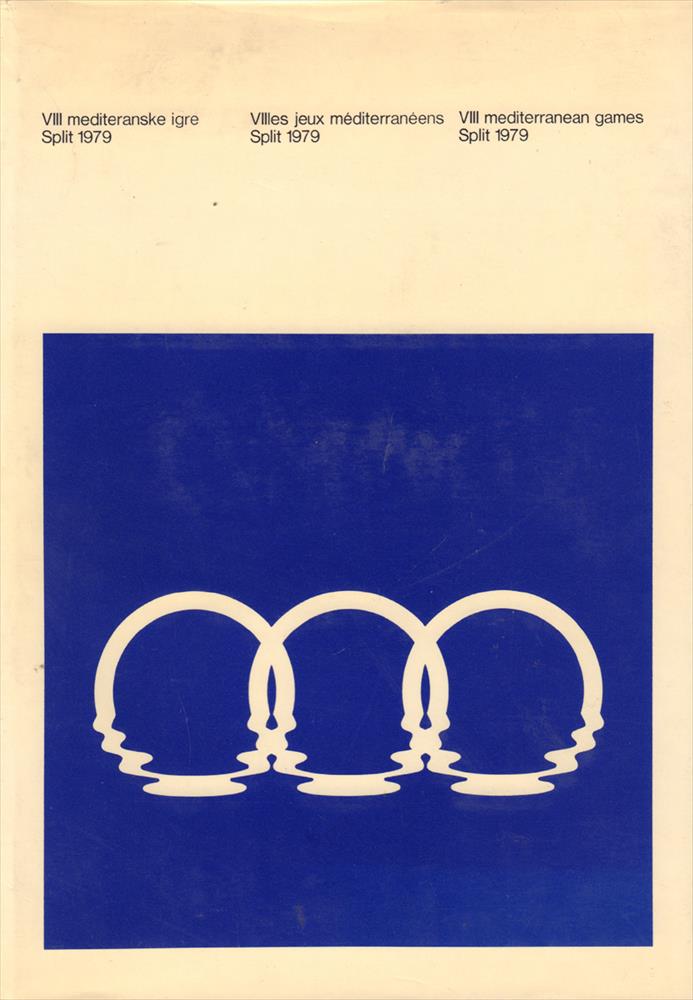
Design by Boris Ljubičić
The 8th Mediterranean Games saw the participation of 2408 athletes (out of which 399 were women), 882 judges, 25 delegates and 811 sports workers, which added up to 4126 accredited persons. Most of the athletes were represented by the countries of Yugoslavia (409), Italy (368), France (287) and Spain (263). The athletes competed in a series of sports, including athletics, cycling, boxing, weightlifting, gymnastics, hockey, wrestling, sailing, judo, kayaking, equestrian sports, basketball, fencing, football, volleyball, swimming, rugby, handball, diving, table tennis, shooting, archery, tennis, water polo and rowing.
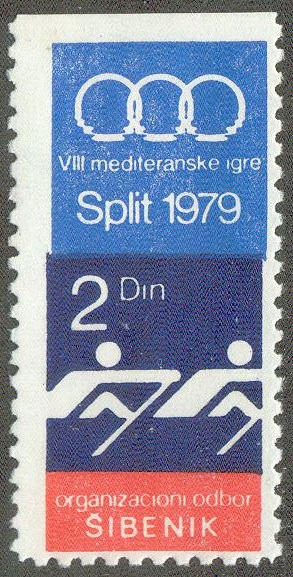
The city of Split did not only receive functional sports facilities for the event, but they also received accompanying infrastructure. A large passenger terminal was built at Resnik (Split) Airport, and a naval terminal was built in the City Port, as well as a new RTV Center. The tunnel through Marjan and the road and rail routes created preconditions for solving traffic problems in the city and its surroundings, and a series of interventions on the reconstruction of electricity, water supply, and sewage systems, and telecommunication connections were carried out.
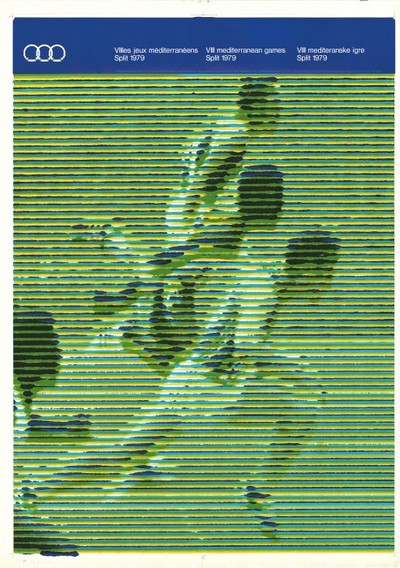
It was necessary to complete the second phase of the construction of the Hotel Marjan and Medena to accommodate the athletes and assistants. The capacity of Hotel Medena, before the start of the additional construction of the bungalow, was 1240 beds, and for the Mediterranean Games, the capacity was increased to 1956 beds. Marjan's capacity rose from 400 to 610 beds. Within the hotel, there was also a congress hall for 600 guests. During the event, the main press center was located there. The Hotel Lav hosted sports workers and representatives from 14 countries who participated in the games. The Bellevue Hotel and the Adriana and Luxor restaurants were also reconstructed. All this construction and the reconstruction of existing facilities cost 2.6 billion Dinars. Split, thus, acquired all the preconditions for accommodating the top athletes in these capital facilities.
The opening of the Mediterranean Games in Split saw a large number of sports and political figures including Michael Morris (Lord Killanin), president of the International Olympic Committee, Josip Broz Tito, President of Yugoslavia and Stane Dolanc, chairman of the Committee of the 8th Mediterranean Games. The Games were opened at Poljud in front of 50,000 spectators.
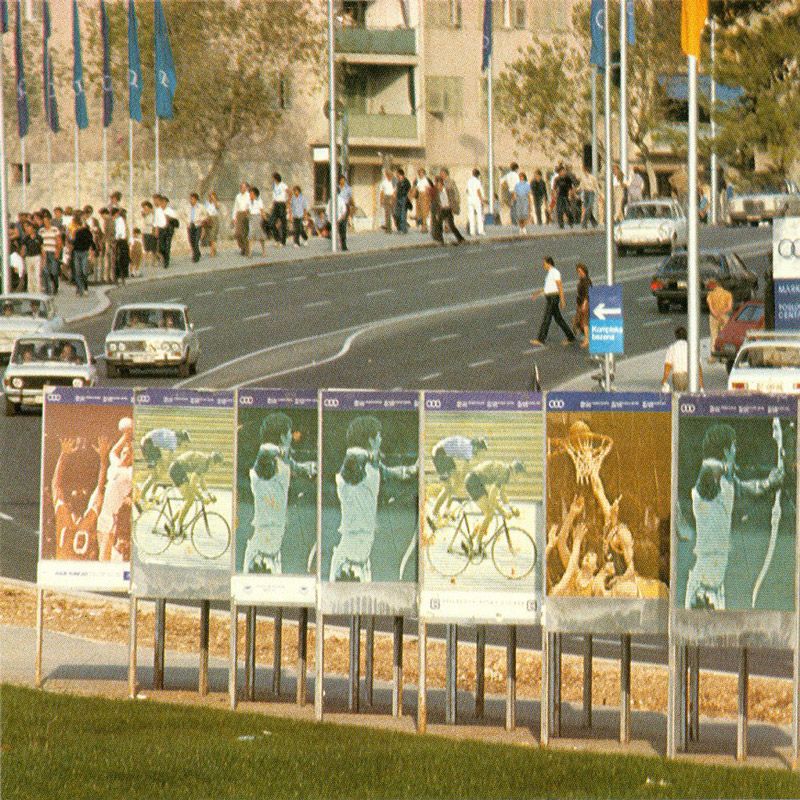
GKMM
Yugoslavia took home the most gold medals from the event (56), followed by France (55) and Italy (49).
Excerpts translated from Mladen Cukrov on GKMM
To read more about lifestyle in Croatia, follow TCN's dedicated page.
On this Day in 1979, Poljud Stadium Opens in Split
September 12, 2019 - Poljud Stadium, one of Split’s most famous landmarks and the home of football club Hajduk Split, opened exactly 40 years ago today for the VIII Mediterranean Games in 1979.
24 Sata reports that Poljud Stadium was built following the project of prominent Croatian architect Boris Magas in 1979 for the needs of the VIII Mediterranean Games, after which it became the home of Hajduk Split. The stadium, known as "The Poljud Beauty”, is interesting because of its architectural composition - its seashell-like design gives views of the nearby hills, sea, and islands, and was modeled after ancient Greek theaters.
The first football match at Poljud was played three days after the opening, but the attendance record was set in 1982 when there were between 55,000 to 60,000 people at the Split stadium. However, since there was no counter at the time, the exact number is based on speculation. The official capacity of Poljud is about 35,000 people.
Numerous sports and other events have taken place at Poljud, which are still held today. From the games of Hajduk to the Croatia national team, music festivals like Ultra, and concerts of Croatian singers, this building has seen it all.
Unfortunately, architect Boris Magas died in 2013, though some six years later, Hajduk hosted his grandson Bartol Pavusek and thanked him for his work and the efforts of his grandfather.
Although it is still one of the most beautiful stadiums in Croatia, many problems plague the 'Poljud beauty'.
At the time of its construction, Poljud’s comfort, unique roof structure and appearance was unsurpassed even in Europe, and because of this, in 2015, it was included in the list of protected cultural assets of the Republic of Croatia. However, the passing of time and poor maintenance have left their mark.
Some say that Poljud’s roof structure is on the verge of collapsing, which resulted in various suggestions, one of them being that instead of the existing Lexan panels, solar panels would be set up to generate electricity and collect rainwater to irrigate the pitch. The investment would pay off in 10-15 years, but, as usual, paperwork and money got in the way.
In the last few years, Hajduk has made several interventions on rehabilitating and maintaining Poljud, with an investment of almost 40 million kuna. In 2019, a traffic light was repaired, in 2018, the damaged pitch from Ultra was changed, and two auxiliary terrains were built. A year earlier, the dressing rooms and all the facilities, such as the gym, first aid room, and fitness room were updated. Previously, the main pitch was drained and irrigated, and counters, barriers, and video surveillance were introduced.
You can visit Poljud next to see Hajduk face Inter Zapresic and Varazdin, or wait until October for the highly anticipated Euro 2020 qualifier between the Croatia national team and Hungary.
To read more about sport in Croatia, follow TCN’s dedicated page.
Ticket Prices Announced for Croatia v Hungary Euro 2020 Qualifier at Poljud
September 3, 2019 - A meeting of the Executive Board of the Croatian Football Federation was held on Monday in Zagreb, where they announced the ticket prices for Croatia’s upcoming Euro 2020 qualifier against Hungary at Poljud.
At the meeting, the ticket prices were revealed for the European Qualification match between Croatia and Hungary, to be played in Split at Poljud stadium on October 10. Prices are as follows:
West: 250 kuna (200 kuna in advance)
East: 200 kuna (150 kuna in advance)
North: 125 kuna (100 kuna in advance)
The South stand is intended for fans of the Hungary national team.
All information about ticket sales will be published later on the HNS website.
Recall, Hajduk will not participate in the organization of the match, and will join the moment problems begin to resolve, the club's president Marin Brbić said at a meeting held back in June.
The City of Split, as the majority owner of the stadium, will lead the organization with the Croatian Football Federation.
At its session on June 12, the HNS Executive Committee decided that the Euro 2020 qualifier between Croatia and Hungary would be played in Split by a unanimous vote.
To read more about sport in Croatia, follow TCN’s dedicated page.
30,000 Expected at Poljud for Eternal Derby between Hajduk and Dinamo
August 31, 2019 - On Saturday at 6:30 pm, the 7th round of the Croatian First League will feature the first derby this season between Dinamo and Hajduk. The two teams will meet at Poljud for what is known around the world as the ‘Eternal Derby’.
It is a chance for Hajduk to reach the top of the standings after 1399 days, with the first victory against Dinamo at Poljud after 1259 days, reports Index.hr.
About 30,000 fans have been announced for the match, making it an ideal opportunity for Hajduk to get a crucial win in front of their fans. Dinamo fan group Bad Blue Boys are also arriving in large numbers, who will be escorted by police from Dugopolje at 4 pm and accompanied to the stadium.
The last time Hajduk celebrated against Dinamo they were led by coach Damir Buric, their coach currently. It was on March 20, 2016, and the winning goal for Hajduk was scored in the 4th minute by Fran Tudor, a footballer who is no longer a member of Hajduk after his contract expired this summer.
"Today, it is worth the same thing. We know how good the opponent is, but we also know what we can do. We have to bring the quality we showed in previous games," Buric said at a pre-match press conference on Friday.
However, Hajduk welcomes Dinamo without Ismajli, Edouk, Posavac, and Juric.
"Their absences have disturbed us a little. Juric is out thanks to a broken bone he didn’t even know he had. We will give those a chance who have not played a lot so far. We hope that Juric and Posavac will be ready for Rijeka. We cannot wait for the match against Dinamo. We don't have a chance to play the Champions League, but now we're going to see how we stand compared to a team playing in the Champions League."
Jakolis returns after suspension for exclusion, will he get a chance?
“I feel sorry for the guy because he is a player who plays with his heart and puts everything into the match. That was the case when he was expelled in Koprivnica. I think it was unfair to him and that exclusion was too strict. For every game, we have a plan. We know what lies ahead, and the most important thing is to design our game,” Buric said.
Dinamo coach Nenad Bjelica also spoke ahead of Saturday's game.
“We expect to win, as always, no matter what stadium or who we play against. Hajduk has played very well in their last two games at home, defeating Lokomotiva and Gorica 3:0. A difficult task awaits us, but I think we are ready. We have recovered from the match against Rosenborg, as you know we have a very wide bench, we are probably going to use all of it and show our true face,” said the Dinamo coach, who was then asked if he dreamed more about Hajduk’s Caktaš or Kevin De Bruyne.
"Neither," laughed Bjelica, and spoke about Hajduk's best player. "Mijo was the best goal scorer last season. We respect him very much. He can handle the game with a single action. We will have to pay attention to him and keep him in control from inside the box. But there are other dangerous players in Hajduk, like Jairo, and we will need maximum concentration to win."
With such a deep bench, we can certainly expect a change in Dinamo’s lineup compared to the match in Trondheim earlier this week, but Bjelica did not want to go into detail.
"We will see after training, and we will practice somewhere around Split. There certainly will be. Hajduk is always motivated against Dinamo, they will be carried by a full Poljud, but we have played in such atmospheres in Budapest and Trondheim, where there were also full stadiums with a great atmosphere, and we came out unscathed. I believe we will succeed in Split as well."
To read more about sport in Croatia, follow TCN’s dedicated page.
Chaos after Hajduk Split Drops Out of Europa League, What's Next?
July 18, 2019 - It was the biggest embarrassment for Hajduk Split in their long history of the Europa League. After a 0:2 victory against Gzira United in Malta, Hajduk managed to lose 1:3 in the return match of the first round of the Europa League qualifiers, in front of over 18,000 of their fans at Poljud stadium in Split.
Hajduk’s Europa League campaign this season is now over. An outcome not even the most pessimistic Hajduk fan could have anticipated.
Hajduk fan group Torcida charged the pitch after the game and chased after Hajduk players before the police intervened. An incident in the West Stands also broke out, and dozens of seats were pulled from the North Stands and thrown onto the pitch. It was bound to be an ugly night in Split.
Hajduk coach Siniša Oreščanin made questionable decisions with the lineup on Thursday, as if the victory in Malta was enough to carry the team through so they could prepare for their first Croatian League match against Istria. What a mistake that was in the end.
At the Hajduk press conference after the game, which didn’t begin for nearly an hour after the final whistle blew, the Gzira coach - as well as 99% of journalists in the room - was in shock.
“I can’t believe we did this against a big club like Hajduk,” the Gzira coach expressed.
While his reaction was expected, we couldn’t imagine how Oreščanin would explain this defeat.
"We went into the first half well, but our mindset fell in the second half, and we conceded two goals after interruptions. No one expected this," said Oreščanin. "That's sport; it will go on."
Answering a German journalist's question of what he has to say about the fan reaction after the game, Oreščanin responded briefly: "That's Hajduk."
Whether Oreščanin will resign is still unknown, as he revealed he would need to speak to the club first and take the next steps accordingly.
Hajduk will open the Croatian First League against Istria on Sunday, though the atmosphere around the club is looking anything but bright.
To read more about sport in Croatia, follow TCN’s dedicated page.
Europa League Qualifiers: Hajduk Split Out After Losing to Gzira United at Poljud
July 18, 2019 - Hajduk Split and Gzira United met in the second leg of the Europa League qualifiers on Thursday night at Poljud Stadium in Split.
After Hajduk won 0:2 against Gzira United in Ta’Qali, Malta for the first leg of their Europa League qualifications, the two teams met again one week later in the sunny city of Split.
Hajduk featured a different lineup than the game in Malta, and instead came out with Duka, Lopez, Barry, Svatok, Beširović, Delić, Jairo, Bašić, Dolček, Tahiraj, and Jradi for the starting 11.
While Hajduk fans don't need much reason to make the trip to Poljud, because it was their first home game of the new season, almost 20,000 spectators were expected to fill the stadium - and over 14,000 tickets were sold by 2 pm on game day! The final attendance was 18,326.
The game began at 8 pm and Hajduk came out with momentum. It didn't take long for the Split club to thank their fans for the support after Jradi scored for 1:0 in the 7th minute!
Gzira was not able to do much against Hajduk in the first 20 minutes and had their first shot on goal only then. Hajduk, however, found ways into the box and had a few chances which hit just wide of the goal.
In the 29th minute, Hajduk had another golden opportunity from a free-kick outside the penalty area, which Lopez made difficult for the Gzira goalkeeper. Delić hit just over the crossbar moments later. The first half ended 1:0 for Hajduk.
Gzira seemed to pick up the pace at the start of the second half, though they were unable to capitalize on their few chances. Hajduk's first real chance of the second half was from Tahiraj, though he shanked his shot far from the goal.
But Gzira's momentum carried them past the Hajduk defense to equalize in the 57th minute. Jefferson scored for 1:1.
Hajduk had a chance to retake the lead in the 59th minute, but a deflection resulted in a corner instead. Delić had a chance minutes later, but hit wide again - and just minutes after that, Juranović hit the post!
In the 67th minute, the Gzira goalkeeper denied Hajduk another opportunity in front of the goal, and it was Gzira to capitalize just two minutes later when Kone scored for 1:2.
Delić once again had the chance to save the day after a brilliant Jurić attack but took one touch too many. Hajduk was pressing but failing to make any gains.
Six minutes of extra time were added and the game took a nasty turn. Gzira scored in the final 30 seconds for 1:3. With this loss, Hajduk is out of Europa League.
To read more about sport in Croatia, follow TCN's dedicated page.
Hajduk Reveals New Away and Third Kits Inspired by Club's History
July 3, 2019 - Just before the start of the new season, fans of Hajduk were presented the club’s new, third reserve kit.
While we know that the home kit is always white and the away kit a mix of blue and red, which are the traditional colors of the Split club, the third, reserve kit this season will feature the shades of light purple, or in other words, lavender. It is an ode the Hajduk’s beginnings, in particular, 1912 and 1913, when the first jersey was the same color. Recall, in recent years, the third kit has been grey or black.
Hajduk revealed the change to their fans on Wednesday.
"The third Hajduk jersey for the 2019/2020 season was inspired by the beginning of the club's activities, more precisely, 1912. After the team formed, they immediately started with the first game. In 1912, goals were set up at Stari Plac for the first time and the team played in purple t-shirts and white trousers
It can be said that it is a jersey of lavender, one of the most recognizable symbols of the Mediterranean. The legendary Luka Kaliterna defended the net of the first team then, and Nikola Gazdić, the first Hajduk footballer to score more than 100 goals for Hajduk, made his debut.
Today, 107 years later, HNK Hajduk presents an almost replica lavender jersey from this important period of the club’s formation, this time created in cooperation with our technical sponsor - Macron, and in which the Hajduk HNK players will play some of their matches in the season ahead. The top is lavender, and the pants are white with motifs of lavender,” Hajduk said on their website.
The third jersey is retro, decorated with a white polo collar and white embroidered sleeves. On the right side of the chest is Macron Hero, the new icon of the technical sponsor, while on the left is the Hajduk coat of arms.
The away jersey, or Hajduk’s backup jersey for the 2019/2020 season, also experienced a change inspired by history. Namely, it pays homage to 1971, which has great significance in the club’s history - it is the year that Hajduk won the championship for the first time after a 16-year dry spell. Then, Hajduk’s tops were red and blue with narrow stripes.
To read more about sport in Croatia, follow TCN’s dedicated page.
It's Official: Ultra Europe Leaves Poljud, Moves to Park Mladeži for Next 4 Years
June 26, 2019 - Just two weeks before Ultra Europe comes to Split, we finally have official confirmation that the internationally popular music festival is leaving Poljud for Park Mladeži.
“At this point, I can confirm that the ULTRA Europe Festival will be held at the Park Mladeži stadium for the next four years. The new location is more spacious and larger and will allow for the further development of the festival and better visitor experience. The agreement was reached in cooperation with the City of Split and the Public Institution 'Split Sports Facilities', and I believe that we will jointly develop the Park Mladeži into a leading sport and event location in the region. We are opening a new chapter of the ULTRA Europe festival, which will continue to generate many positive changes in the music industry, Croatian tourism, and economy in the coming years,” said Joe Bašić, director of MPG Live, the official organizer of the ULTRA Europe festival.
Recall, since no agreement was signed between Ultra and Hajduk, the festival organizers turned to alternative solutions, and RNK Split’s stadium Park Mladeži (Youth Park) was the first location that came to mind.
Hajduk often highlighted the destruction of their field after Ultra as one of the biggest problems brought by the festival, which is part of why the two sides couldn't agree.
Hajduk was looking for Ultra to cover all the costs incurred by the club for holding the festival, and above all to financially cover and secure a new field in time as to not repeat, for example, last year’s catastrophe when the lawn was not brought in on time. The two sides never saw eye to eye.
More information will be announced on Thursday.
The Ultra Europe festival will be held in Split from July 12 to 14, 2019.
To read more about lifestyle in Croatia, follow TCN’s dedicated page.


